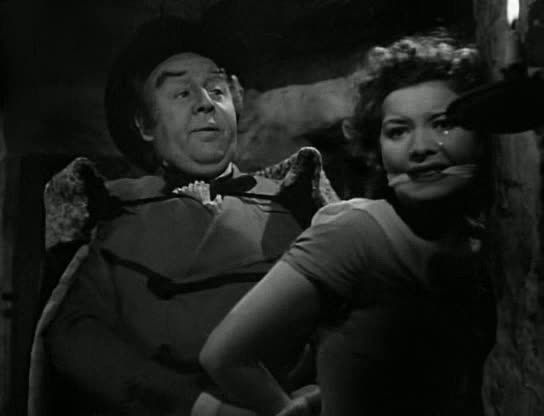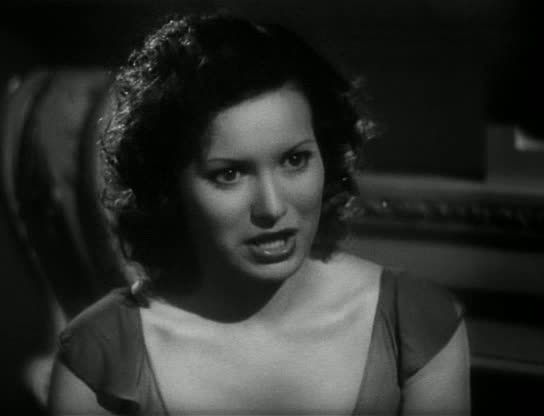 [This post is one last late contribution to the third annual For the Love of Film blogathon and fundraiser, which ran from May 13-18. This year, hosts Marilyn Ferdinand, Farran Smith Nehme and Roderick Heath have dedicated the week to Alfred Hitchcock, whose early (non-directorial) work "The White Shadow" will be the beneficiary of any money earned during the event. Be sure to donate!]
[This post is one last late contribution to the third annual For the Love of Film blogathon and fundraiser, which ran from May 13-18. This year, hosts Marilyn Ferdinand, Farran Smith Nehme and Roderick Heath have dedicated the week to Alfred Hitchcock, whose early (non-directorial) work "The White Shadow" will be the beneficiary of any money earned during the event. Be sure to donate!]Jamaica Inn was the final film of Alfred Hitchcock's British period, made just before the director emigrated to Hollywood. Hitchcock was purportedly not very happy with the film, which he made quickly and cheaply, in a hurry to get to America. It's certainly not one of the director's most characteristic works, a period pirate drama based on a Daphne Du Maurier novel. It's obvious the director is distracted and not fully engaged, and the film is pretty much as dire as its reputation suggests, mostly lacking in Hitchcock's characteristic visual rigor. Instead, it's talky and plodding, with little to recommend it beyond some showy performances and the occasional nice visual flourish.
Maureen O'Hara, fresh-faced and beautiful, is "introduced" in the opening credits, since this was her very first starring role. As Mary, she's playing an avatar of innocence and goodness, stumbling into the center of a den of thieves when she goes to stay with her Aunt Patience (Marie Ney) and Uncle Joss (Leslie Banks). Joss, it turns out, is the leader of a group of pirates based at the Jamaica Inn, a base of operations from which they lure unsuspecting ships to crash on the rocks, plundering the shipwrecks and killing any survivors to coldbloodedly eliminate any witnesses. Joss, unbeknownst to Mary or anybody else, gets his orders from Sir Humphrey (Charles Laughton), a local dignitary who Mary has met and thinks of as an ally. When Mary arrives at the Jamaica Inn, she quickly disturbs the pirate gang's plans, freeing the pirate Trehearne (Robert Newton), who is being hanged as a traitor by the rest of the gang.

The film is primarily an acting showcase for Charles Laughton, shamelessly hamming it up as Sir Humphrey, a role substantially expanded and changed from the Du Maurier novel especially for Laughton to sink his teeth into. He seems to be having a blast playing this man living a double life as a well-respected lord and a smuggler boss. When he's not bellowing enthusiastically for his servants, he's pattering in a rapid stream of pretentious wordplay and speechifying, all bluster and stilted mannerisms. It's an over-the-top performance, though Laughton modulates his hysterics towards the end of the film, when he finally reveals his villainy to Mary, dropping all pretense and affecting more of a quietly sinister demeanor, projecting menace in silky tones. At this point, he becomes something of a memorably Hitchcockian villain, binding Mary and taking her away as he unleashes a mad stream of vitriol.
Hitchcock shows only sporadic signs of being visually engaged by this material. In one scene, as Trehearne tries to convince Patience to let him go, Hitchcock's camera whips rapidly back and forth again and again from one of them to the other as they exchange lines, arguing over the man's fate. Hitchcock also makes the scenes out in the countryside very stark and dark, set in a bleak rocky wasteland with perpetually gray and cloudy skies hanging above the hideously warped landscape. The exterior scenes have an eerie, minimalist artificiality that's bracing and potent, creating an evocative atmosphere. In one scene, as Trehearne and Mary hide from the pursuing pirate gang, Hitchcock places them in the foreground of the shot, in front of a jagged rocky wall that obscures them from the villains scurrying around in the background of the shot. The docks where Humphrey takes Mary at the end of the film are also moodily shot, covered in shadows, betraying the influence of German expressionism, though Hitchcock doesn't linger long in this foggy locale.
On the whole, though, such evocative moments are rare, and Jamaica Inn winds up being one of Hitchcock's very worst films. Hitchcock was on his way to Hollywood, and his first film there would be another Du Maurier adaptation, Rebecca, the sensuous style and psychological depth of which only confirms how slapdash and uncharacteristic this final British film was.

7 comments:
Yeah... this one's not very good. It's boring, and that's saying a lot for Hitch. I remember so little about it (I didn't even recall Maureen O'Hara being in it until you mentioned her here... and I still don't remember her scenes!), and the one scene I do seem to recall is the ending, when Laughton is up on the mast of a ship with a little girl, or maybe Maureen O'Hara, or somebody...? while the cops are down on the street. Or something?
I actually own this movie, and if I wanted to I'd watch it again to refresh my memory on these scenes that are a bit of a blur. But life is just way too short!
Hitch at low mast. What a ham Laughton is here -- a fop caught between Oscar Wilde and Dame Edith Evans, as I've written elsewhere.
Your Hitchcock pieces are fantastic, by the way.
Thanks, Adam and Mark. This is definitely bottom of the barrel for Hitchcock. Not much to recommend it, and it really does feel like he made it just to fulfill his contract. There are few other films in his oeuvre in which he seems so little engaged.
Yep, absolutely one of Hitch's worst films, some would have it at the top. But as you relate the master was readying for his departure to Hollywood, and heck he did do Ms. du Maurier justice once, and what a film he made there. One can set aside JAMAICA INN, which was his last bad film I think. Terrific work throughout this series, Ed.
Sam, I think you're right that this is his last all-out bad film. I'm no big fan of Lifeboat and a couple of the later films are shaky, but he'd never sink as low as this again.
I mainly remember the coastal scenery and moody photography from this one, and Laughton hamming it up - I'd vaguely remembered it as melodramatic fun, but your review makes me think I'm only remembering the best bits, Ed! I won't hurry to revisit it.
The moody atmosphere is definitely the high point of the film; it frequently looks nice, in a rough, hazy way, even if the film itself is pretty lame.
Post a Comment